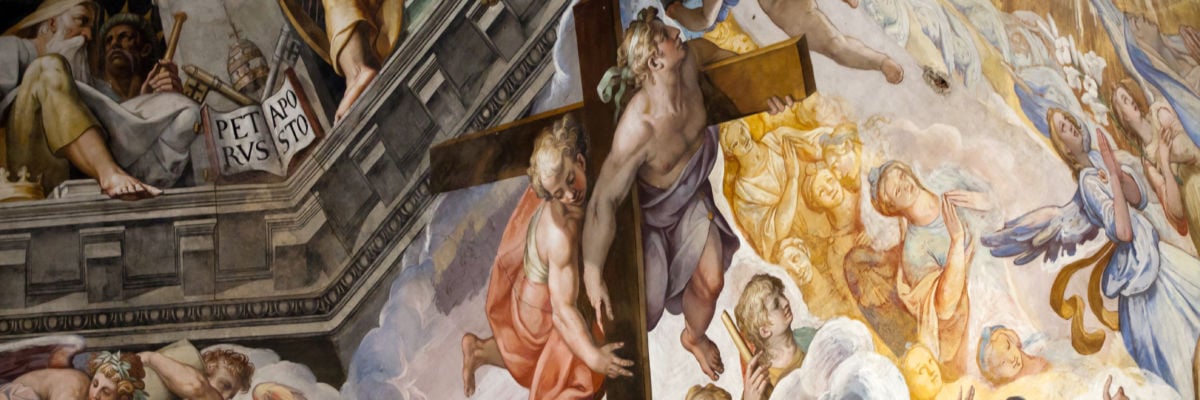
Jesus teaches in Matthew 12:32, “Whoever says a word against the Son of Man will be forgiven; but whoever speaks against the Holy Spirit will not be forgiven, either in this age or in the age to come.”
Catholics have cited this text as support for the doctrine of Purgatory throughout the centuries. For example, Pope St. Gregory the Great wrote that, from this passage “we understand that certain offenses can be forgiven in this age, but certain others in the age to come” (Dial. 4, 39). It has even found its way into official Catholic teaching. The Catechism of the Catholic Church appeals to this bible passage when it defines Purgatory as an after-death “final purification of the elect” (1031).
But some Christians don’t think this passage supports Purgatory. In a previous article, I responded to one of the reasons why they think this. Let’s consider another here.
Some say the Catholic interpretation of Matthew 12:32 is flawed because it entails bad logic, since it posits an affirmation based on a negation. The Catholic interpretation seems to affirm that sins will be forgiven in the next life because Jesus says the sin against the Holy Spirit can’t be forgiven in the next life.
As Peter Martyr argued in the sixteenth-century, that would be like saying King Philip is not king of the Venetians, and therefore someone else is King of the Venetians. This clearly is fallacious reasoning because the throne of the Venetians may be vacant for a time when King Philip is not king of the Venetians.
Protestant apologists Norman Geisler and Ralph McKenzie pose a similar challenge when they ask “How can the denial that this sin will ever be forgiven, even after death, be the basis for speculating that sins will be forgiven in the next life?” They seem to be saying that you can’t go from “X is not forgiven” to “some Xs are forgiven.”
What can we say in response?
It’s true that you can’t reason from “X is not forgiven in the next life” to “some Xs are forgiven in the next life” in fact. But it is reasonable to go from “X is not forgiven in the next life” to it’s possible that “some Xs are forgiven in the next life,” and that’s all the Catholic interpretation implies.
This logic is no different than saying that since the sin against the Holy Spirit can’t be forgiven in this life it’s reasonable to conclude that some sins can be forgiven in this life—that’s to say, it’s possible. Whether other sins in this life are in fact forgiven is a separate issue: someone must in fact repent. But that it’s possible for them to be forgiven of sins in this life is clear.
Consider this example. We might not be able to say, “someone is king of the Venetians” based on the fact “King Philip is not king of the Venetians.” But it is reasonable to say, “it’s possible for someone to be king of Venetians.” In other words, given that there is a throne of the Venetians, which currently isn’t occupied by King Philip, it’s possible for someone to sit upon it as king. If it weren’t possible for anyone to be king, then it would be unintelligible to speak of King Philip not being king of the Venetians.
Coming back to Matthew 12:32, it’s true we can’t conclude, “Some sins are forgiven in the age to come,” based on Jesus’ statement, “the sin against the Holy Spirit is not forgiven in the age to come,” because it very well may be that in fact every soul dies without the need to have sins forgiven in the next life. But it at least implies that it’s possible for sins to be forgiven in the next life, on condition that there is a next life, which there is, and a soul dies with sins that need to be forgiven. To deny such a possibility makes Jesus’ statement unintelligible.
Catholic apologist Dave Armstrong explains the argument this way:
[M]entioning “the age to come” assumes the premise that such things can happen in the afterlife; after death. Otherwise, why mention it? We don’t include in our observations what we regard as a falsehood or impossible. No one would say, for example, “a circle is round and also is square.” The first thing is obviously true, and the second is categorically impossible. If Jesus thought (like Protestants) that there is no forgiveness (or purgatory) after death: as a categorical impossibility, then I submit that He would have never mentioned even its theoretical potentiality. He simply wouldn’t bring it up at all. He doesn’t teach falsehood, being God and omniscient.
Since Jesus does mention the “theoretical potentiality” of sins being forgiven in the next life, we can conclude it’s possible for sins to be forgiven in the next life. And that possibility will become actual if a saved soul departs from the body with the guilt of unrepented venial sins, since nothing defiled can enter heaven (Rev. 21:27).



